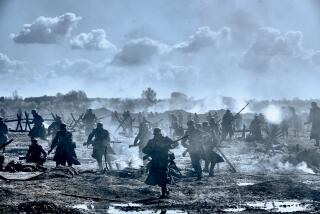A Heartfelt Thank You 50 Years in the Making
For almost 50 years, Sam Dierinzo had wanted to say thank you.
The Northridge man got his chance Sunday at a seniors gathering at Century City Hospital.
The guest speaker at that event, an old-fashioned ice-cream social and information fair sponsored by the hospital and the Westside Consortium of Senior Services, was actor Lew Ayres, 81.
Most people know Ayres as Hollywood’s original Dr. Kildare and as the young German soldier who reaches for a butterfly just before he is killed in the final frames of the classic anti-war film, “All Quiet on the Western Front.”
But Dierinzo met Ayres in the flesh in 1944 in an Army hospital in the Philippines. Dierinzo, now 65, was a teen-age soldier, recovering from a back wound he received from a Japanese sniper on the island of Leyte (“I’m still scratching it for him,” his wife, Marge, said). Ayres was a conscientious objector who had refused to fight but spent almost all of World War II serving as an Army medic.
It would make a better story, Dierinzo acknowledged, if Ayres, who was under fire many times, had carried Dierinzo bleeding from the battlefield. Ayres didn’t.
“He didn’t save my life or anything,” Dierinzo, manager of fleet operations for Anheuser-Busch in Sylmar, said.
Rather, Ayres had done the ordinary things medics do: bringing Dierinzo a bedpan, helping ease the discomfort of a cast that encased him from neck to knees, stopping in to talk from time to time.
What distinguished Ayres, Dierinzo recalled, was his manner and his compassion. “He was so different in his mannerism and his politeness and his kindness,” Dierinzo said. “In your hour of need like that, it just reminded you so much of home.”
Not surprisingly, Ayres, who still plays an occasional movie or TV role, didn’t recognize the former soldier when Dierinzo introduced himself.
“Good morning, Mr. Ayres,” he said. “I had the pleasure of meeting you many, many years ago.”
Dierinzo told Ayres that his wartime kindness “helped me out a lot. I always wanted to meet you and thank you.”
The men reminisced for a few moments. Ayres recalled how much the war had taught him about himself and his fellow man. “I’m grateful I had the experience,” he said. “I don’t regret one moment.”
Later, Ayres said that making “All Quiet on the Western Front” in 1929 may have started him on the controversial road to pacifism. At some point he realized that he couldn’t kill, even for his country.
“I knew I couldn’t live with myself,” he said. “I could understand a society needing to protect itself, but I couldn’t do it.” He said he still believes that nonviolence is usually more effective than violence, but he realizes, in retrospect, that Nazism “had to be stopped.”
Dierinzo described meeting Ayres again as a “wonderful experience.”
After their brief reunion, Ayres spoke to the crowd of about 300 on such matters as his lifelong study of world religions and having his first and only child at age 60.
He called his remarks “Reaching for the Butterfly.”
More to Read
Only good movies
Get the Indie Focus newsletter, Mark Olsen's weekly guide to the world of cinema.
You may occasionally receive promotional content from the Los Angeles Times.









